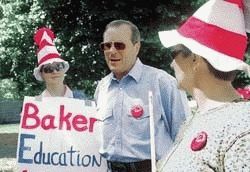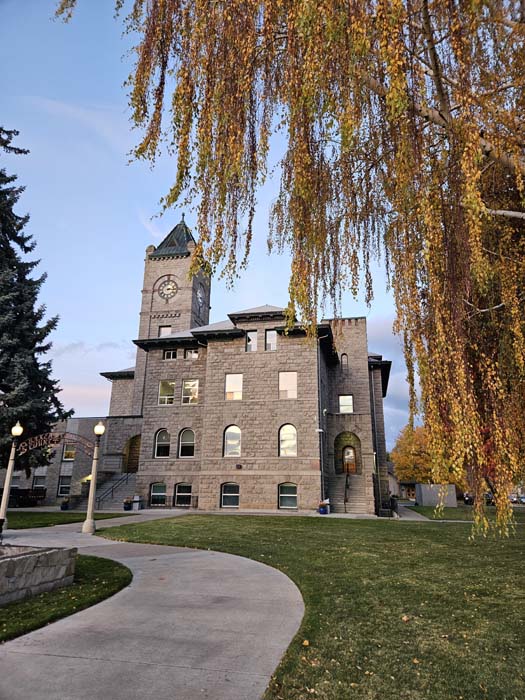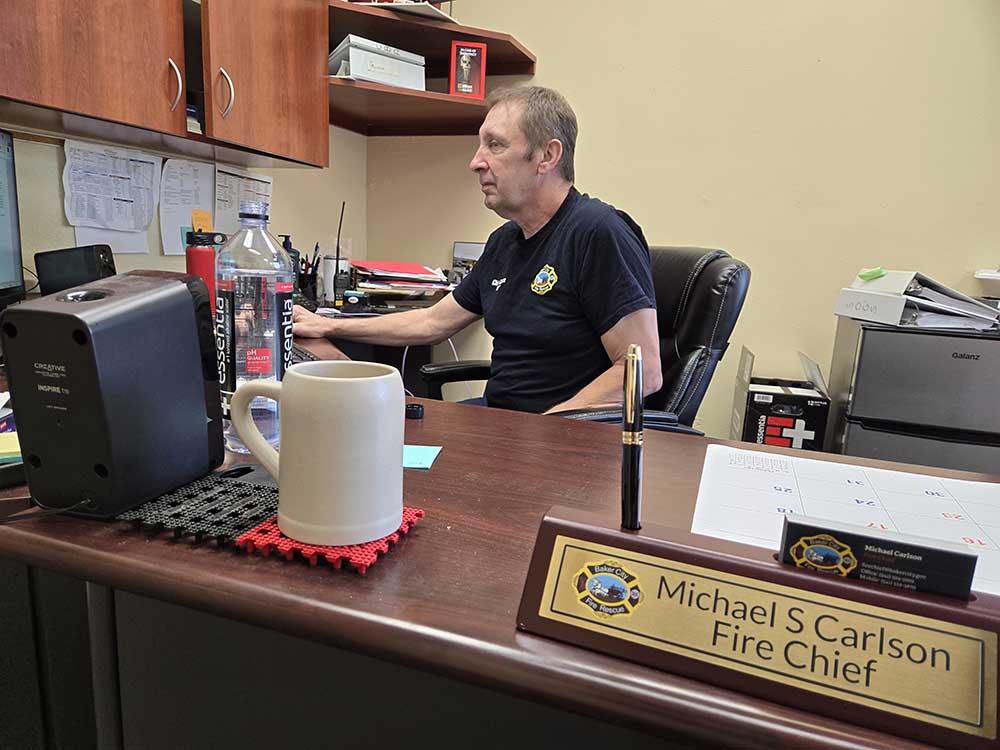Gubernatorial candidates visit Eastern Oregon early and often
Published 12:00 am Friday, September 14, 2001

- Democratic candidate Ted Kulongoski chats with Miners Jubilee festival-goers in Baker City. He has experience as state attorney general, Supreme Court justice and legislator and ties to Central Oregon, where he has family. (Baker City Herald photograph by S. John Collins).
By JAMES SINKS
Of the Baker City Herald
SALEM In the not-so-distant past, gubernatorial candidate Neil Goldschmidt who would go on to win the office in 1986 scoffed at the notion of staging a debate in Central Oregon, calling it the middle of nowhere.
The remark certainly didnt win the Portland Democrat style points east of the Cascades, but it underscored a political truism: When it comes to elections, the power was in the populous west side, particularly in the Willamette Valley.
But dont tell that to the candidates who are seeking to step into the governors office following the November 2002 election.
Well before the traditional Labor Day launch date for the race for the states top office, hopefuls with all political stripes were beating a worn path to the middle of nowhere and they say Eastern and Central Oregon voters should expect to see them plenty in the coming year.
You arent going to hear anybody call it that anymore, laughed Bev Stein, a former Multnomah County Commissioner who is part of a crowded field seeking the Democrat nomination. She appeared at her booth at the Deschutes County Fair and will stage an ice cream social in Bend next month.
Contenders say they want to bring a divided Oregon together. And in the most competitive field in years, they cant write off any part of the state.
Former Attorney General and Supreme Court Justice Ted Kulongoski, a Democrat, was in Bend in early August and Baker City for Miners Jubilee, shaking hands and getting to know voters who cant remember so much attention from gubernatorial candidates.
All I can say is, its good, good, good, said Jefferson County Commissioner Mike Ahern. Any connection you can make with the person who then becomes governor is good for a local community. The Cascades are getting lowered a little bit.
On the Republican side, Labor Commissioner Jack Roberts and Portland attorney Ron Saxton have been frequent eastside visitors.
Saxton included Baker City on his six-city itinerary announcing his candidacy June 1, and returned earlier this month to meet with local residents. That same tour included stops in Bend, Redmond and Madras.
Roberts said the rapid growth of Bend and Redmond had made the region an important campaign destination. He calls it a crossroads.
Former state Rep. Kevin Mannix used a June Republican Party meeting in Central Oregon to announce his intent to investigate a potential campaign. Hell decide whether to launch an official bid in September.
Goal: Bring the state together
All of the candidates say basically the same thing about their courtship with the east side: They want to be governor of the entire state, and want to help bring rural and urban Oregonians closer together.
Whether you can get elected isnt the issue, Kulongoski said. You cannot govern without the support of rural Oregon, and without rural Oregon at the table and part of the process to get solutions.
Each candidate also said the states economic future hinges on narrowing the economic disparity between the states bustling cities and struggling small towns.
But with a wide field seeking the Democrat and Republican nominations next spring, theres also a healthy degree of political strategy behind their early forays into the Oregon Outback, said Portland independent political researcher Jim Moore.
The Democratic race is now a three-way bid between Kulongoski, Stein and former Treasurer Jim Hill since U.S. Rep. Peter DeFazio elected not to jump in. Republicans could choose between three candidates if Mannix opts to run.
And because none of the hopefuls is a household name, it means votes are up for grabs everywhere, Moore said. In addition, candidates are going to rural towns to court potential political donors, including timber and agricultural companies, he said.
Eastside can get on the agenda
From a sheer numbers standpoint, candidates will still certainly find more voters in the Portland metropolitan area. The population of all 18 eastside counties doesnt even add up to the total in Multnomah County alone.
But the voters in conservative-leaning rural Oregon will play a big role in who gets the Republican nod in the primary, and could tip the balance in a close race between Democrats, Moore said. And in the general election, the Republican is going to need to win and win big in rural counties in order to capture the vote statewide, he said.
Whichever way the vote falls, rural voters will benefit from the attention because theyll be able to keep their issues on the front burner, much like Oregon was able to do as a tossup state in the 2000 presidential campaign, Moore said.
Eastern Oregonians need to take advantage of that opportunity and get those issues out.
Amy Casterline, manager of Mannixs exploratory committee, said Central and Eastern Oregon are pivotal. Contrary to what some people think that once you get past the mountains theres only two people, people really underestimate the power of that voting block, she said.
Added Saxton: The practical thing is every vote counts.
The state Democratic Party, recognizing that growth in Central Oregon is making it a player statewide, has scheduled a summit in late September in Bend, which will include a gubernatorial forum, said executive director Neel Pender.
Baker County Commisisoner Brian Cole has met with every announced candidate but Hill in recent months and said the attention will pay dividends.
They all are acutely aware and genuinely concerned about the sense of two Oregons, he said.
They probably get better turnouts in rural parts of the state because we have problems out here and we want to work with next governor to solve them, he said. The fact there is a lot of competition is to rural Oregons advantage because we are getting more action out here on our issues.
All of the candidates say they will emphasize helping to bridge the rural-urban gap.
It is important to not just do a field program and get votes but also to find out what matters to rural areas in the next 30 years, said Maria Smithson, Hills campaign manager.
While the high tech economy gave us a decade of prosperity, Oregon is still an agricultural state and it is important to recognize that.
Hill will push to expand more telecommunications capacity in rural Oregon, she said.
Kulongoski said a key goal should be continuing to expand access to higher education in Central Oregon and elsewhere, both by nuturing the new Cascades Campus of Oregon State University in Bend and by connecting more people to rural community colleges. He also believes the natural resource industry needs to continue to play a vital role.
Labor Commissioner Roberts said rural voters are interested in new ideas about how to heal the breach, and not from a purely Portland-centric perspective. For instance, he believes the Klamath Basin water crisis could have been less extreme if a more rural-sensitive governor was in office.
Pendleton Democrat Mike Thorne, who dropped out of the race a week ago, said its vitally important for all candidates to improve the quality of life in rural Oregon.
You can win an election statewide and not win rural Oregon, but I dont think you can govern effectively, he said.
He noted that, despite his offhand middle of nowhere comment, Goldschmidt became quite popular in rural Oregon because he focused on trying to help solve problems across the state.
Time will tell whether next years candidates truly help rural Oregon catch up, he said.
Its not good for people to be mistrustful of each other, said Stein, who said shell visit every county at least once a year if elected. Its very important to communicate. We have differences, but we all live within one border.
Saxton said hes found, somewhat discouragingly, that people in almost every place he visits . including Portland . believe they are the ones in Oregon who have been left behind.
They think nobody is paying attention to them, he said. Im running in an effort to address that, and you cant talk about caring about all of Oregon and not bother to go see it.
James Sinks is Capitol reporter for the Baker City Herald and Western Communications.






